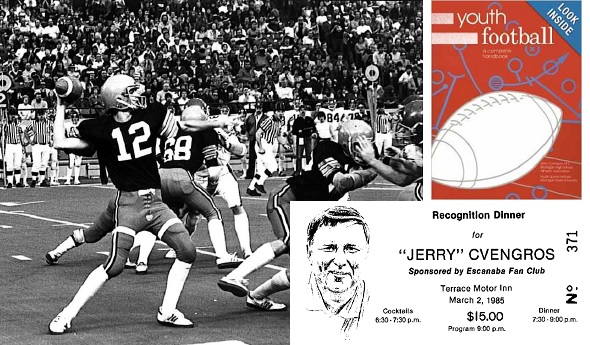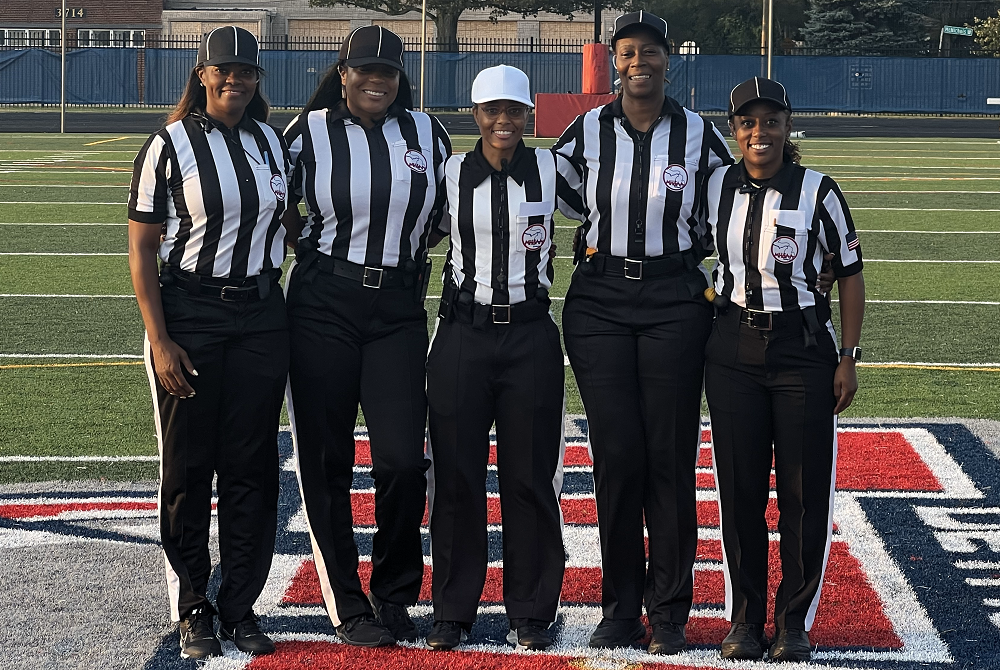
Cvengros Leaves Lasting Impact
By
Geoff Kimmerly
MHSAA.com senior editor
April 1, 2014
Retired Associate Director Jerry Cvengros, who served at the Michigan High School Athletic Association for more than 13 years after three decades at Escanaba High School, died Monday evening in Lansing. He was 80.
As lead assistant to Executive Director John E. “Jack” Roberts from August 1988 until retiring in January 2002, Cvengros served as director of football and briefly hockey in addition to coordinating the Program of Athletic Coaches Education (PACE), presenting annual in-service training for administrators and serving as MHSAA liaison to statewide principals, athletic directors and coaches associations.
 He came to the MHSAA after 30 years at Escanaba, where he taught, coached, served as athletic director and later principal during a tenure stretching from August 1958 through July 1988. While at Escanaba, Cvengros also represented Upper Peninsula Class A and B schools on the MHSAA Representative Council from 1983-88 and served as the Council’s president from 1986-88.
He came to the MHSAA after 30 years at Escanaba, where he taught, coached, served as athletic director and later principal during a tenure stretching from August 1958 through July 1988. While at Escanaba, Cvengros also represented Upper Peninsula Class A and B schools on the MHSAA Representative Council from 1983-88 and served as the Council’s president from 1986-88.
Cvengros received the MHSAA’s Charles E. Forsythe Award in 2000 in recognition of his many and significant contributions to interscholastic athletics.
“During his lifetime, Jerry Cvengros impacted every area of interscholastic athletics as a coach, athletic director, principal and then associate director of the MHSAA," Roberts said. “He was the perfect combination of fairness, toughness and diplomacy, able to draw on a vast knowledge of MHSAA rules and an understanding of educational athletics fostered by his various experiences.
“Jerry was known and respected statewide for his dedication, and his contributions have had a lasting impact.”
Cvengros built an elite football program at Escanaba as varsity head coach from 1962-84, leading the Eskymos to a 161-42-3 record, a Class A runner-up finish in 1979 and the MHSAA championship in 1981. That team remains the only Class A/Division 1 team from the Upper Peninsula to win an MHSAA football title. Cvengros was inducted into the Michigan High School Football Coaches Association Hall of Fame and served on its original Board of Directors.
His 1979 team fell to Detroit Catholic Central 32-7, but he brought the Eskymos back to the Finals for a 16-6 win over Fraser two seasons later. Cvengros' championship lineup included quarterback Kevin Tapani, who would go on to pitch for the Minnesota Twins among five major league clubs, and tailback Dean Altobelli, who later played at Michigan State University. The title run included a 15-14 Semifinal win over Dearborn Fordson that included a savvy two-point conversion call by Cvengros, who wanted to avoid overtime after a late score drew Escanaba to within a point of tying the score.
As the MHSAA’s director of football, Cvengros was instrumental in creating the current playoff format that expanded the field from 128 to 256 teams beginning with the 1999 season. He also co-authored “Youth Football: A Complete Handbook,” a guide to coaching at that level.
Among many additional honors, Cvengros was inducted into the Upper Peninsula Sports Hall of Fame and Michigan High School Coaches Association Hall of Fame and received the Distinguished Service Award from the Michigan Interscholastic Athletic Administrators Association. The National Federation of State High School Associations twice awarded Cvengros with a Citation – the NFHS’ highest honor – for his service as a coach and then as a member of the MHSAA staff.
Since his retirement, Cvengros and his wife Shelley have continued to reside in Okemos. A visitation will take place beginning at 10 a.m. Monday, April 7, at St. Martha Parish in Okemos, with a funeral Mass to follow at 11 a.m.
Cvengros was a 1951 graduate of Ironwood High School and went on to study and play football at the University of Wisconsin in Madison. He earned his bachelor’s degree in secondary education and teaching from the University of Wisconsin-Superior and a master’s from Northern Michigan University.
He taught English, history and physical education at Escanaba High School and also coached basketball and track and field. He became the school’s athletic director in 1970, added the duties of activities director in 1975 and became principal in 1983.
Cvengros is survived by his wife and children Michael, Steven and David, and seven grandchildren. He was preceded in death by his daughter Lee Ann (Cvengros) Swasey in May 2013.
PHOTOS: (Clockwise from left) Escanaba quarterback Mike Beveridge fires a pass during the 1979 Class A Final; Cvengros co-authored a book on coaching youth football; Cvengros was celebrated once more in Escanaba following his final season as football coach.

All-Woman Football Officiating Crew Makes History, Inspires More to be Made
By
Keith Dunlap
Special for MHSAA.com
September 26, 2023
Caryn Jackson said it “started to hit her” at about noon, some seven hours before kickoff.
An official for football games at both the high school level in Michigan and the college level for the Great Lakes Intercollegiate Athletic Conference, Jackson started to fully realize what a special event she was about to participate in.
Jackson was assigned to be the head line judge for the Waterford Kettering at Detroit Lincoln-King varsity game last Thursday at Detroit Mercy, but this was a different assignment than any other.
In addition to Jackson, there were four more women to form what’s believed to be the first all-female officiating crew for a varsity football game in state history.
With that in mind, Jackson posted what was about to happen on her X (Twitter) feed hours before the game.
“It had 23,000 engagements in an hour,” Jackson said.
And all this happened without any retweets from her daughter Rikea Jackson, the 2019 Miss Basketball Award winner at Detroit Edison who plays for Tennessee and has over 10,000 followers.
The football game arrived, and right away spectators sensed they were watching history unfold.
The crew of Jackson, referee Nicole Randolph, line judge Delonda Little, umpire RanDee Henry and back judge Kamaria Douglas made history and inspired others during a night that should be impactful for a long time.
And this also wasn’t the first time they’ve led in the officiating world.
Randolph is a Big Ten football official. As noted above, Jackson officiates Division II college football. Douglass, Little and Henry all are college basketball officials as well, and Little in March became the first woman to officiate an MHSAA Boys Basketball Final since 1995 when she refereed the Division 3 championship game at Breslin Center.
Here are thoughts from all five about their unforgettable evening on the football field:
Kamaria Douglas: “It was very well-received, which was an even better feeling,” she said. “There were a lot of people, whether we were in the parking lot afterward or just chit-chatting, who wanted to take pictures. People gave us kudos and flowers and said we did a nice job. It’s one thing to get an opportunity, but also to go out there and do a good job. They want to see more of it. Waterford Kettering’s coach said he was the father of three girls, so it just warmed his heart. He came over and got a picture with us, which was really cool.”
RanDee Henry: “This game, although historic, was even more amazing because I got to do it with friends,” she said. “All of these women have strong friendships on and off the field, making this moment even more amazing and monumental.”
Very honored and proud for the Waterford Kettering Football program for being part of MHSAA history with the first ever all female group of officials for our game. Congrats to all five of them. @WKFootball1 @WKHSCaptains @WSDATHLETICS @MHSAA @michiganhsfca pic.twitter.com/HJvtEMSnXA
— Coach Bob Chiesa (@ChiesaBob) September 22, 2023
Caryn Jackson: “For my children, I always tell them to leave your mark wherever you go and whatever you do,” she said. “Be a part of history. Who knew I would be refereeing high school, let alone doing it with all women? It feels good when I walk the football field and people are cheering just because they see a woman. People say ‘I’m glad you’re here, ref.’ I’ve had young boys walk up to me and shake my hand and say thank you for making history, and that you’re the first female official I have had. That stuff makes me feel good. To do it alongside four other women, that was amazing.”
Delonda Little: “Women are breaking barriers, and it’s nice to be acknowledged and to have some gender equality out there,” she said. “We all felt good to get the support during the game from the coaches and the fans. Both coaches told us we did a great job. Coaches wanted to take pictures with us to be a part of the historical moment. Fans as we were leaving told us we did a good job.”
Little continued: “Women, we still have a long way to go. But it’s good we are getting the acknowledgment we deserve. There should be gender equality.”
Nicole Randolph: “The players kind of got the adrenaline going,” she said. “I was already a little nervous going into the day because it was really happening. When I got to the field, I was calm, cool and collected. When we all walked onto the field, the players were excited, and the coaches were excited. They asked for pictures and said they wanted to take pictures at the end of the game because they had never seen this many female officials at a game.”
Randolph continued: “We went in and said ‘Hey girls, this a great opportunity. Let’s make the best of it so we can continue to open the doors for other young ladies to continue to aspire (in) our footsteps.’”
PHOTO Thursday's crew at Detroit Mercy, from left: head line judge Caryn Jackson, umpire RanDee Henry, referee Nicole Randolph, line judge Delonda Little and back judge Kamaria Douglas. (Courtesy photo.)

